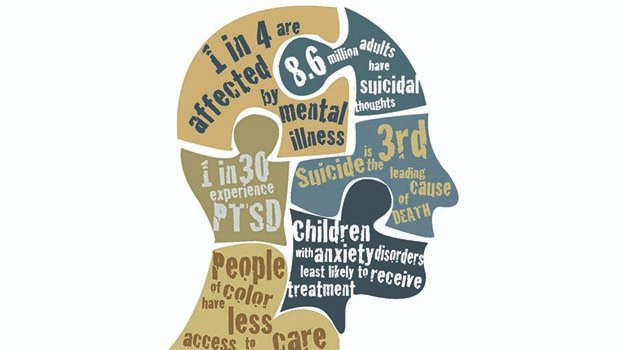Mental health enigma

This is startling to note that almost in every village and town of Bangladesh one will find a troubled soul (labelled as ‘pagol’ or mad) wandering aimlessly. Atik is one of those unfortunate persons, who belongs to Kadamtali, a small village located on the bank of the river Titas. People of his village say that Atik was a good student as well as a popular fisherman. But unfortunately he got addicted to Yaba and after using the drug for four years he lost control over his sense, and gradually got the label of ‘pagol’.
The twist of destiny later displaced him in Dhaka and now Atik can be found on different streets of this heaving capital. One can see him wandering alongside busy traffic, sometimes begging, sometimes going through bins for food. However, it cannot be denied that such mentally disordered persons can be traced who are left on the streets in different parts of the country.
Depression, drug addiction, and lack of money are the main reasons why they are left on the streets. It is ridiculous that we neither have taken any steps to trace the number of such people nor have we integrated any intervention and social security system to rehabilitate those mentally disabled people left on the streets. Definitely here comes the responsibility of the authorities concerned to intervene immediately in this regard.
However, apart from those so called ‘pagol’ left on the streets, there are thousands of people among us, particularly youths, who are suffering from mental illness and reports tell us that the number of mental health patients are on the rise in the country. Reportedly, 17.8 per cent teenagers, 18.4 per cent children and 16.1 per cent adult people in the country suffer from some sort of mental disorder.
On Thursday, Bangladesh observed the ‘World Mental Health Day’ like elsewhere in the world with the theme – “Mental Health Promotion and Suicide Prevention”. Every year World Mental Health Day is celebrated globally on October 10 as an opportunity to highlight international advocacy and efforts to reduce mental health stigma. Mental illness is a major health challenge in global context, and in Bangladesh it is yet to receive the mass attention as a public health crisis.
This year’s theme – “Mental Health Promotion and Suicide Prevention” is an important subject for us in the 21st century. World Health Organization (WHO) data show that globally close to eight lakh people die of suicide every year. Studies further show that a large percentage of suicides are preventable if people get timely and adequate treatment for mental health disorders.
Youth suicide is a perpetual dilemma in any form of societal structure. The reasons for attempting to suicide sometimes become more mysterious than the phenomenon itself. The reasons for suicide often lie on the characteristics of a country’s demography and societal structure. There were people in the UK who killed themselves after listening to metal gods like Judas Priest and Ozzy Osburne. Every year, thousands of youths around the world kill themselves after taking an overdose of drugs. Whatever the reason, each and every incident of youth suicide not only in Bangladesh but also across the globe unveils the collective failure of the respective societies to instil the importance of life into the sensitive psychology of interpretation of the youths.
However, people in Bangladesh perhaps do not have that luxury of sacrificing lives after listening to songs. Here the reasons for suicide are quite predictable. Depression, anxiety, marital problem, love-breakup and poverty are the common reasons for suicide in Bangladesh.
What is most disheartening about youth suicide in Bangladesh is that despite experiencing an increasing number of youth suicides, the issue has been overlooked by the authorities concerned, society, parents and teachers. We often write about the education system, we complain about the lack of qualified teachers in our schools. But we hardly emphasize youth suicide caused by the overwhelming characteristics of our education system.
Most of the schools in Bangladesh do not have any infrastructure to deal with students’ mental health issues. Apart from a few elite schools and some schools under the national curriculum, most of the schools do not provide any counselling facilities. Hence, it is high time to deploy and integrate psychologists and establish centres for psychological counselling at schools.
Reportedly, in Bangladesh at least 342 children committed suicide and 28 more attempted in the last 11 months. In most cases, exam failure and humiliation for getting lower grades are identified as the reason for suicide. The unhealthy competition for better grades has become a symbol of ‘status’ in society and can be addressed as one of the main reasons for youth suicide. Emotional abuse for getting poor marks in exam has long been a distinct characteristic of our schools and society. And the unhealthy competition is too much to handle for a young mind which spurs them to lose self-confident and attempt to suicide.
Suicidal behavior has existed throughout human history, but due to several complex factors, it has increased gradually in all parts of the world and, in the past few decades, has reached alarming statistical levels.
Suicide is a global public health problem that deserves the attention of all the actors in the field of mental health, including scientific and professional organizations, organizations for mental health users and their families, and universities. It deserves particular attention from national health authorities, since it is their responsibility to craft policies and directives aimed at establishing strategies to prevent suicide and promote public’s mental health. The role of both print and audiovisual communication media and of social media is no less important, since their participation can have positive as well as negative effects, depending on how they address this subject. There are numerous complex factors that contribute to a suicide, but what is most important is that all of our actions must be geared toward prevention.
S H B Shuvro is a member of the Editorial Team of Bangladesh Post



